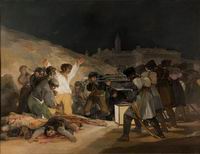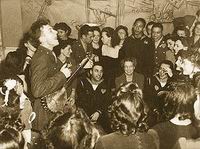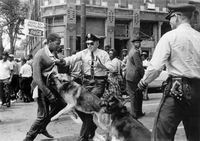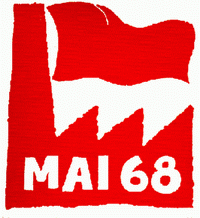Seeds of Fire: A People’s Chronology
Recalling events that happened on this day in history.
Memories of struggle, resistance and persistence.
Compiled by Ulli Diemer
|
May 3, 1808
|

|
|
French occupation forces take brutal reprisals against the citizens of Madrid after the failed uprising of the previous day. Hundreds of people are rounded up and shot. The event is commemorated by Francisco de Goya’s painting, ‘The Third of May 1808: The Execution of the Defenders of Madrid.’
|
|
May 3, 1919
|

|
|
Birth of Pete Seeger, radical American folksinger.
|
|
May 3 - 13, 1926
|
|
|
British workers go out on a general strike. The strike is triggered by mine owners who announce that they plan to slash miners’ wages, which have already been repeatedly cut (from œ6.00 to œ3.90) over the course of the past seven years. When miners balk at accepting another reduction, mine owners lock them out of their workplaces on May 1. The mine owners are in a position to sit out a long dispute because they have just received a large government subsidy.
The Trades Union Congress calls a General Strike to begin on May 4. Close to two million workers go out on strike. The government sets out to crush the strike, with Chancellor of the Exchequer Winston Churchill playing the leading role, using the army and middle-class vigilante organizations. On May 13, the TUC calls off the strike, though the miners continue to resist for several months before being driven back to work by hunger and despair.
|
|
May 3, 1936
|
|
|
The French election results in the victory of the “Popular Front,” a coalition of left parties, including social democrats and Communists. The Popular Front wins 386 out of 608 seats, and Socialist leader Léon Blum becomes Prime Minister. The decision to form a Popular Front grew out of concern over the growing strength of fascism, marked by the Nazi seizure of power in Germany and the growth of the fascist movement in France.
The Popular Front government sets out to bring in a series of reforms, including new labour laws recognizing the right to collective bargaining and an increase in the minimum wage. A lack of a clear shared program by the component parties limits the government’s achievements, and in 1938 the Popular Front dissolves itself.
|
|
May 3, 1963
|

|
|
In Birmingham, Alabama, Public Safety Commissioner “Bull” Connor and his men attack children on a freedom march with fire hoses and police dogs to prevent them from leaving the “Negro section” of town and reaching the downtown. The police attack comes in the midst of a series of increasingly determined anti-segregation protests in Birmingham.
Television coverage of the extreme police brutality and mass arrests (by May 7, 2,500 people are in jail in Birmingham) causes outrage in the U.S. and internationally. The protests continue, and all normal life in Birmingham ceases.
Suddenly the dam breaks: on May 8, Birmingham businesses agree to end segregation, on May 11 Bull Connor is thrown out of office, and on May 13 the federal government sends in 3,000 troops to take control of the city over the protests of Alabama governor George Wallace. In June the ‘Jim Crow’ signs imposing segregation come down forever.
|
|
May 3, 1968
|

|
|
Students at Sorbonne University in Paris gather in a mass meeting to protest the closure of the university the day before by the university administration. The administration’s action is an attempt to put a stop to the student protests that have been going on for months.
It has the opposite effect: by the next week, a million people are in the streets; the week after, workers across the country go on strike and occupy factories, and France stands on the brink of revolution.
|

